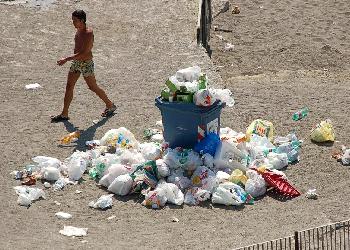
BRUSSELS, Belgium, January 25, 2017 (ENS) – The amount of marine litter polluting European waters would be halved by 2030 under new waste management proposals agreed Tuesday by the European Parliament’s Committee on the Environment, Public Health and Food Safety, usually called the ENVI Committee.
The Committee approved moves to curb sources of marine plastic pollution as part of a package of measures intended to reduce waste that will form the basis for Parliament’s vote later this year on the Circular Economy Package.

In a circular economy, the value of products and materials is maintained for as long as possible; waste and resource use are minimized and resources are kept within the economy when a product has reached the end of its life, to be used again and again to create further value.
As part of a shift in EU policy towards a circular economy, the European Commission has made four legislative proposals introducing new waste-management targets regarding reuse, recycling and landfilling.
Improving waste management could deliver benefits for the environment, climate, human health and the economy, said the ENVI Committee.
The share of municipal waste to be recycled should be raised to 70 percent by 2030, from 44 percent today, while landfilling, which has a big environmental impact, should be limited to five percent, said ENVI Committee MEPs, as they amended the draft EU Waste Framework Directive legislation.
By 2030, at least 70 percent by weight of municipal waste from households and businesses should be recycled or prepared for reuse, say MEPs. The European Commission proposed 65 percent.
Other amendments also increased the ambition of recycling targets proposed by the European Commission, with 60 percent of plastic packaging to be recycled by 2025 and 80 percent of all packaging waste by 2030.
For packaging materials, such as paper and cardboard, plastics, glass, metal and wood, the ENVI Committee MEPs propose an 80 percent target for 2030, with interim 2025 targets for each material.
The amendments establish measures to promote reuse and recycling, such as encouraging deposit-refund plans for bottles and cans.

If approved by the full Parliament, the amendments would require EU Member States to do more to tackle commonly littered items entering marine waters.
MEPs also agreed on amendments to the EU Packaging & Packaging Waste Directive, requiring Member States to achieve sustained reductions in packaging which is excessive or non-recyclable.
Statistics from 2014 suggest that 44 percent of all municipal waste in the EU is recycled or composted. This compares to just 31 percent in 2004, and by 2020 EU member states should be recycling or composting over 50 percent of waste.
“The ENVI committee has showed that it believes in the transition towards a circular economy. We decided to restore the ambitious recycling and landfill targets in line with what the Commission had originally proposed in 2014,” said lead MEP Simona Bonafè of Italy, who is with the Progressive Alliance of Socialists and Democrats.
“There will no longer be the possibility for Member States with the lowest recycling rates to have a ‘blanket’ derogation. They will be able to request a derogation, but it will be subject to specific conditions,” she said.
The draft law limits the share of municipal waste to be landfilled to 10 percent by 2030. MEPs propose tightening this to 5 percent, although with a possible five-year extension, under certain conditions, for member states which landfilled more than 65 percent of their municipal waste in 2013.
In 2014, Austria, Belgium, Denmark, Germany, the Netherlands and Sweden sent virtually no municipal waste to landfill.
But EU countries such as Cyprus, Croatia, Greece, Latvia, Malta and Romania still landfill more than three quarters of their municipal waste.
The MEPs also advocate a 50 percent reduction in food waste by 2030.
Food waste in the EU is estimated at some 89 million tonnes, or 180 kg per person per year.
MEPs advocate an EU food waste reduction target of 30 percent by 2025 and 50 percent by 2030, compared to 2014. They propose a similar target for marine litter.
The four proposals in the package will be put to a vote by the full House at the March 13-16 plenary session in Strasbourg.
Sarah Baulch, oceans campaigner at the Lond-based Environmental Investigation Agency, EIA, welcomed the vote, saying, “The European Parliament has considerably raised the bar on efforts to tackle the major threat of marine plastic pollution but much more needs to be done.
“Ever-increasing numbers of marine species are ingesting plastic and these amendments are just a start to achieving a significant reduction in marine plastic pollution in European waters,” she said.
EIA is part of the global #breakfreefromplastic movement which is working to stop plastic pollution.
EIA senior lawyer Tim Grabiel said, “Today’s vote is a clear sign to EU Member States that marine plastic pollution needs to be much higher up their agendas. We urge them to ensure measures to tackle this problem are strengthened as negotiations continue.”
The Circular Economy Package is part of several ongoing efforts to rid EU waters of marine plastic pollution.
The European Commission is currently considering revisions to the Port Reception Facilities Directive, which manages waste generated at sea, and is set to release its Strategy for Plastics in the Circular Economy for public consultation which aims to reduce plastic entering the marine environment.
Copyright Environment News Service (ENS) 2017. All rights reserved.
© 2017, Environment News Service. All rights reserved. Content may be quoted only with proper attribution and a direct link to the original article. Full reproduction is prohibited.
